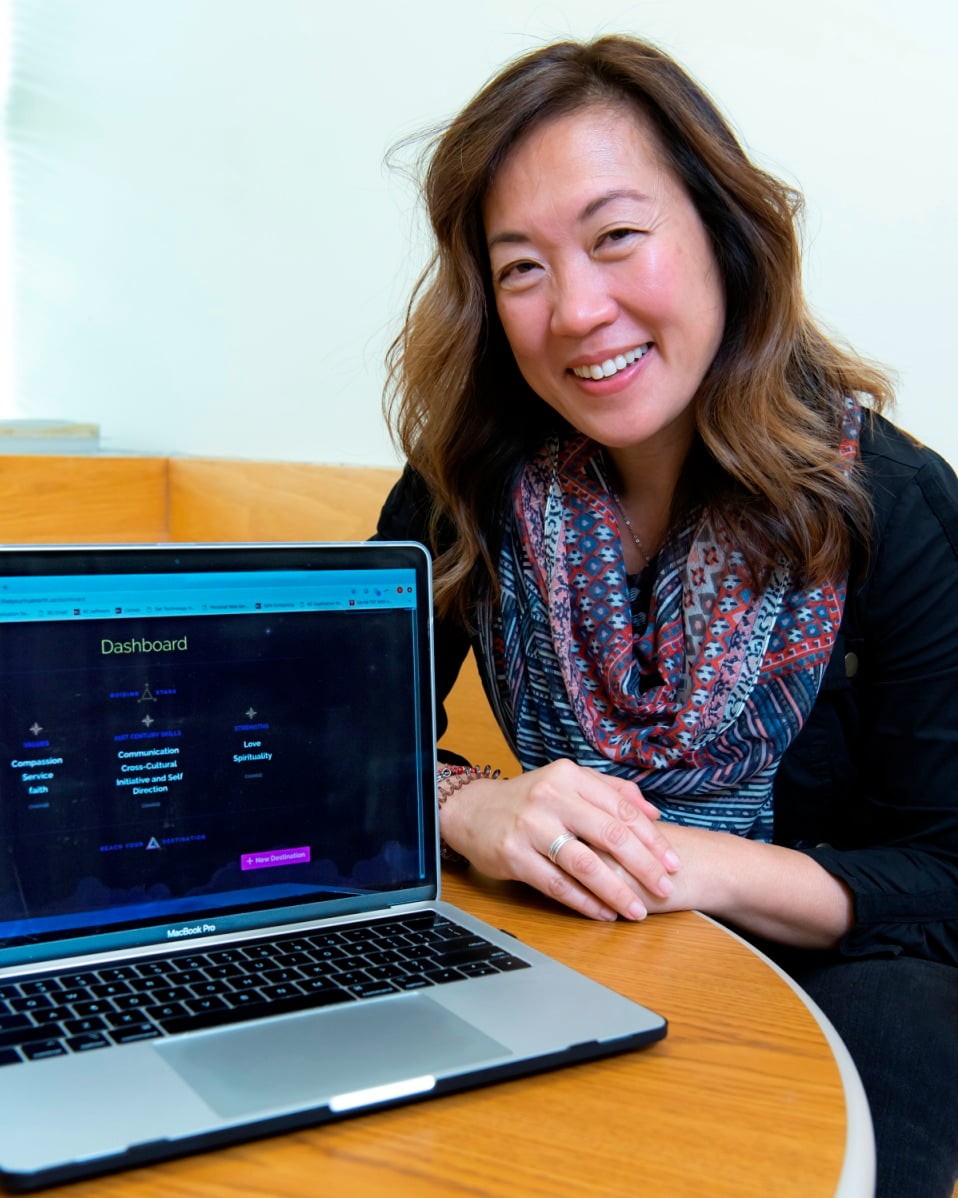Imagine you’re an explorer searching for the geographic or “true” North Pole. Your compass won’t help you, because it points toward magnetic north—not “true north,” your actual destination.
Students trying to discern the path toward their ultimate, personal, and professional goals face a similar problem if their own “compass”—like the magnetic compass pointing askew from true north—guides them to attractive yet unfulfilling outcomes.
To help students explore the most significant questions of their young lives, and to scaffold them on their college and vocational journey, Lynch School of Education and Human Development Professor Belle Liang and her research team are developing a digital application they’ve named “True North,” a term often defined as the force that guides and fuels a person’s ambitions.

Lynch School of Education and Human Development Professor Belle Liang (Lee Pellegrini)
Said Liang, who teaches in Counseling Psychology, “In a world with so many challenges and infinite ways to make a difference, students are overwhelmed with critically important questions: How do I make good with the privileges I’ve been given? How do I focus my energies and talents? Who do I want to be and what direction do I want my life to go? How do I navigate the college experience so I can best leverage the opportunities before me during this fleeting ‘window of time?’”
These student-posed questions prompted Liang and colleagues to envision a web-based app whose goal is to foster student formation and purpose during adolescence and emerging adulthood. The True North app uses evidence-based best practices in youth purpose and formative education to help students investigate and discover personal pathways to finding “purpose,” which goes well beyond the narrow definitions of success in a society that frequently emphasizes personal fame and fortune as the definitive measure of achievement.
“BC students are part of Generation Z, the demographic cohort born between the mid-1990s and the mid-2000s, who have grown up during the most ‘game-changing’ period of technological advancement in history,” she explained. “This digital generation is trying to find their purpose, but they need modern tools to do so, and that means applying our research findings on purpose development in classroom curricula as well as in digital spaces where they are most at home, socializing, connecting, and exploring.”
“ True North will help students selectively design their undergraduate years, curate the abundance of resources BC has to offer, and set them up for success in college, their careers, and their lives. ”
Liang, a BC parent, characterizes True North, now in beta testing, as a decision-making tool that guides students through a systematic discernment process, integrating and updating the Jesuit spirituality that grew out of the experience of Ignatius Loyola.
“Based on our research findings, we’re building a flexible, in-person curricula as well as an app through which students can identify their respective ‘callings’ or long-term, personally meaningful aspirations that are simultaneously of consequence in the world. They then intentionally plot their college experience so that it aligns with what is personally meaningful to them, as well as what is professionally practical. True North will help students selectively design their undergraduate years, curate the abundance of resources BC has to offer, and set them up for success in college, their careers, and their lives.”
True North guides students to zero in on four elements called the “4 P”s that contribute to finding purpose based on Liang’s and her colleagues’ research: People—empowering relationships with those who nurture and encourage them in their journey toward purposeful aspirations; Passion—defining what is loved and valued; Propensity—identifying particular skills and strengths related to one’s purpose; and Prosocial benefit—identifying ways to use one’s passions, strengths, and skills that contribute toward the greater good.
“The desire for purpose seems universal,” she said. “Our research has focused on young people from a variety of demographic backgrounds, and ‘purpose’ was relevant for youth from the most marginalized to the most privileged communities. It’s critical to us that our work on the True North project represents a true community partnership of researchers and practitioners from diverse settings.”
Specifically, the digital application has been developed in collaboration with her research colleagues, Professor Terese Lund (Wingate University) and Professor Angela DeSilva Mousseau (Rivier University), and Tim Klein, a former high school guidance counselor who is director of Strategic Partnerships at Project Wayfinder, a purpose-learning curriculum designed at Stanford’s Hasso Plattner Institute of Design (known as “the d. school”) that equips students with tools and skills to create purposeful lives. Liang’s research team is informed by and comprised of Gen Z students from various backgrounds at BC and beyond. The True North curriculum will be piloted with first-generation, low-income college students this fall.
Her effort dovetails with the University’s Strategic Plan that calls for a re-commitment “to formation among students, faculty, and staff to further Boston College’s mission and strengthen its institutional culture” during the next decade and beyond.
Liang reports that she and her team have already envisioned True North “2.0”—a more advanced version of their original concept—and are excited to join with Lynch School Charles F. Donovan, S.J., Dean Stanton Wortham and others at BC who are dedicated to creating tangible tools for purpose and formative education that will empower all higher education students to find their way from college to career.
“The app and the purpose curricula are an effort to combine the best research and practice in formative education at the Lynch School, with what we know about helping people identify and pursue their purpose,” she said.
“I’ve heard many people, including parents and professionals from various sectors, claim that you have to choose between pursuing a vocation that you’re passionate about and pursuing one that is professionally practical. They argue that students can’t have it both ways. What our research—and the tools we’re building—are about is finding that intersection, that true north.”
—Phil Gloudemans, University Communications | May 2019




